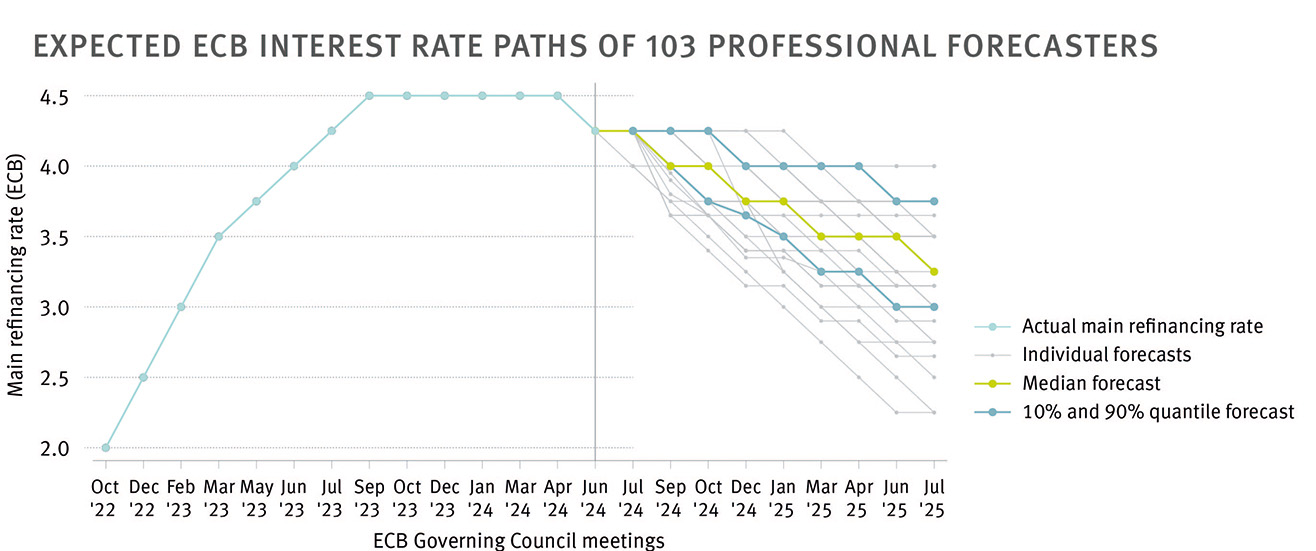Respondents Do Not Expect ECB Rate Cuts in July
ResearchZEW Policy Brief on ECB Interest Rate Expectations from Financial Market Experts
After the European Central Bank (ECB) cut interest rates in June 2024, the financial experts surveyed by ZEW Mannheim do not expect the ECB to lower interest rates further in July. Instead, they anticipate the next rate cut to take place in September 2024. In general, the majority of participants expect additional rate cuts at every second ECB meeting over the next 12 months. However, the experts’ assessments of future interest rate developments vary widely, indicating a high degree of uncertainty about the further monetary policy path. These are the results of special questions included in the ZEW Financial Market Survey from June 2024 with answers from 103 experts, which researchers from ZEW Mannheim and Heidelberg University analysed in a ZEW policy brief.
“Most respondents expect the ECB to cut rates in September and December 2024. However, they do not foresee a linear downward movement of interest rates but rather phases during which the ECB Governing Council will keep rates at the level of previous meetings, in line with ECB President Christine Lagarde’s statements on a future data-driven approach to monetary policy adjustments,” explains Dr. Alexander Glas, project leader of the ZEW Financial Market Survey in ZEW’s “Pensions and Sustainable Financial Markets” Unit. “At the same time, we see that respondents have very different assessments of the ECB’s future interest rate path – there is no clear majority opinion on how exactly the ECB will adjust rates in the next 12 months. However, the experts agree that the key interest rate will settle between 3.0 and 3.75 per cent in a year’s time, most likely at 3.25 per cent.”
Interest rate cuts dependent on macroeconomic data
Almost none of the survey participants expect another rate cut in July 2024, as they likely believe that the ECB will wait for new data and updated macroeconomic forecasts in the summer. Only three per cent of respondents expect an interest rate cut in July 2024, 68 per cent in September, 24 per cent in October, and 73 per cent in December. Many respondents anticipate a rate cut in December 2024, as important data, such as euro area GDP and wage data for the third quarter of 2024, will be published before this ECB Governing Council meeting. The trend towards interest rate cuts in meetings at which new macroeconomic projections are published continues for 2025. Thus, only 16 per cent expect a rate cut in January 2025, 69 per cent in March, 21 per cent in April, 61 per cent in June, and again only 16 per cent in July. The analysis also confirms that respondents base their ECB interest rate forecasts on expected inflation figures rather than GDP developments.
Significant differences in interest rate path estimates
The interest rate expectations of analysts were evaluated in the form of interest rate paths, showing significant differences: 51 of 103 paths are singular, with little agreement in the estimates.
Nevertheless, 23 respondents selected a path that anticipates rate cuts of 25 basis points each in September and December 2024, as well as in March and June 2025, resulting in an interest rate of 3.25 per cent in June 2025. At the end of the forecast period, 80 per cent of participants expect the main refinancing rate to be between 3.0 and 3.75 per cent, with 3.25 per cent being the most common prediction. Only two respondents expect interest rates to fall to 2.25 per cent by June 2025, while seven experts expect a main refinancing rate as high as four per cent by July 2024.
About the survey
The ZEW Financial Market Survey has been carried out on a monthly basis since December 1991, collecting expectations about the development of major international economies. Currently, these are Germany, the euro area, the USA as well as China. The panel consists of about 350 analysts from banks, insurance companies and large industrial corporations, working in the finance, research, and macroeconomics departments, as well as in the investment and securities departments of these companies. Most participants come from Germany.
The analysts are asked about their expectations for a six-month horizon regarding economic development, inflation rate, short- and long-term interest rates, stock prices, and exchange rates. Additionally, they are asked to assess the earnings situation in 13 German sectors. The survey consists of two parts: one fixed survey part and special surveys on current issues. The experts’ expectations regarding the future economic development in Germany serve as a basis to calculate the ZEW Indicator of Economic Sentiment, which has established itself as an early indicator for economic development (“ZEW Index”). In the June wave, the participants were also asked to give their expectations for interest rate changes at all upcoming ECB Governing Council meetings between 18 July 2024 and 24 July 2025. Similar forecasts were also requested for the meetings of the US Federal Reserve. Since the expected interest rate paths are likely influenced by anticipated macroeconomic conditions, especially expected inflation due to the ECB’s strategy, the experts were also asked about their short- and medium-term inflation and GDP growth expectations for the euro area.
A ZEW policy brief was created for this purpose. The results of the Financial Market Survey are also published in the monthly ZEW Financial Market Report (in German only).
